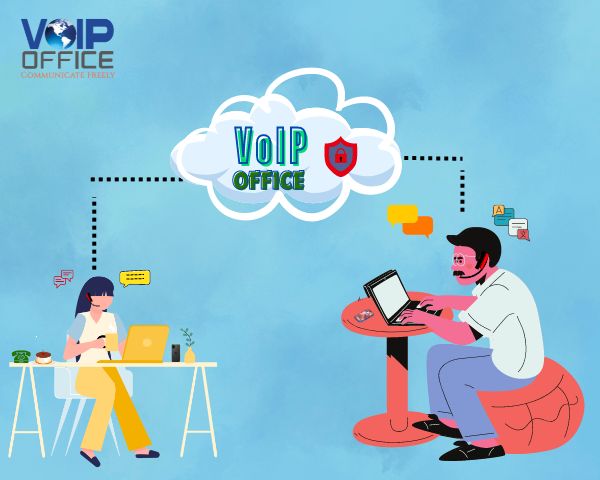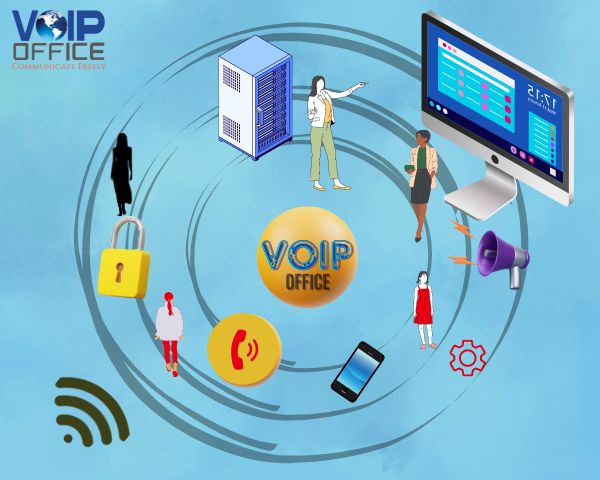VoIP (Voice over Internet Protocol) relays multimedia and voice content over an internet connection. It helps make calls from the comfort of mobile phones, computers, VoIP phones, and WebRTC (Web Real-Time Communication) browsers.
VoIP started becoming popular by the end of the 1990s and started having upward growth by the middle of the 2000s. From then on, VoIP never looked back and never showed any sign of slowing down, as remote work started becoming more and more common and all businesses sought various solutions to support their teams that were distributed remotely.
Secure communication helps protect the sensitive data of businesses and their existing customer’s information, thus helping in the prevention of any breach in data that could bring loss of finance and eventually damage the reputation of any business.
Importance Of VoIP Security
VoIP security is essential for protecting systems from hackers who attempt to access sensitive communication data. A secure VoIP communication system provider like VoIP Office has got secure encryption, along with systemized network security measures that gets regularly updated and patched promptly.
It helps secure the customer’s data and reaps the benefits of VoIP, enhancing simplified communication that saves time.
Are VoIP Calls Secure
VoIP as a communication tool is economical, fast and the most favorable for organizations in the present era. A lot of development has been made in VoIP cybersecurity.
Since VoIP works in internet protocol, it could be open to attack, but that need not be the case. The customers of VoIP communication providers will be concerned about VoIP cybersecurity at some point, and the providers will have to give a satisfying answer with guidance to win over and retain happy customers.
VoIP communication systems transfer data over the internet. Phone calls are digitally transmitted rather than sent through traditional telephone lines.
Since it works on the internet, hackers could hack it. The calls could be vulnerable in a few cases, and hackers can use them to enter the servers’ portals. One good piece of news about VoIP is that it can be secured using methods of essential cybersecurity and good practice.
VoIP v/s Landline Phones
Previously landlines were much in use by business houses, but now they are depending on a VoIP service provider to make their calls; these calls are more secure than calls made through landline phones.
Voice calls made through landlines get routed through PSTN (Public Switched Telephone Network) and are not encrypted, which makes them more prone to interception. On the other hand, VoIP calls are transmitted over the internet with secure encryption.
VoIP offers security features like authentication protocols that help alleviate business security risks. These systems are cheaper since they do not require installation and maintenance for telephone wiring when onboarding new users. VoIP issues are more straightforward to fix with a correct course of action from a reliable VoIP provider.
VoIP Security Issues
The risks related to VoIP are like the risks of any internet application. A few security issues are,
SPIT (Spam Over Internet Technology)
Spam over internet technology is like hybrid telemarketing and spamming through email. The attackers send uninvited calls and voicemails. The SPIT attackers use tools that are available on the internet.
Monitoring Calls
Monitoring calls, also known as eavesdropping, involves an attack of unwarranted individuals listening to VoIP calls. Here, the hacker exploits all the weaknesses in the VoIP communication channel and proceeds to access sensitive personal and business conversations.
Tampering The Calls
The hackers try to disrupt the calls made by VoIP users. They transmit large amounts of data along the same path as the call, leading to inconsistent call quality. Sometimes, hackers use delay tactics to delay the delivery of data packets between VoIP callers. It makes communication more challenging, sometimes resulting in a long silence between the callers.
DDOS Attacks
DDoS (Distributed Denial of Service) attacks stagger the server, as they disrupt the system framework with too much traffic, disrupting VoIP services. The VoIP user will not be able to receive or make calls.
Virus & Malwares
As VoIP systems and their network applications hook into the internet, they become targets for malware and viruses.
Spoofing Caller ID
VoIP attackers try to exploit caller ID information by imitating as authorized VoIP callers and then access unauthorized sensitive information. Just like spam calls, stating that the call is from a bank, and the customer unknowingly gives out the account number and other personal details.
Accreditations For VoIP
The VoIP communication service provider must meet all the regulatory and standard requirements for securing the phone system. Following are the top certifications that VoIP providers should possess,
HIPAA Compliance
HIPPA (Health Insurance Portability and Accountability Act) compliance is of supreme importance, as it helps to protect the patient’s data in the healthcare industry. HIPAA has made it mandatory for all service providers in the healthcare industry to protect such information.
The regulations also make sure that the phone communication systems used by healthcare organizations, including call recordings and even voicemails, maintain patient privacy by properly implementing security measures on the VoIP servers.
Companies dealing with protected health information (PHI) must possess a proper network and physical presence and must implement and follow security measures to ensure HIPAA compliance.
ISO/IEC 20071
ISO/IEC 20071 (International Organization for Standardization/International Electrotechnical Commission) is an internationally recognized standard for information security. It puts down specifications for a successful ISMS (Information Security Management System). It helps business organizations perfectly manage people’s sensitive security information through technology.
PCI Compliance
PCI (Payment Card Industry) Compliance. To protect the credit card data of cardholders, the business organizations should follow both technical and effective working standards. Even when users process their cards for transactions. PCI Security Standards Council manages and develops this compliance.
SOC 2 Compliance
SOC 2, known as Service Organization Control Type 2, is a compliance cybersecurity framework that was developed by AICPA (American Institute of Certified Public Accountants). The primary purpose of SOC 2 is to ensure that third-party service providers process client data securely.
Best Practices for VoIP Security
VoIP services come with risks. Follow these best practices to secure them,
Deploying Firewalls
Using proper firewalls and IDS (Intrusion Detection System), the voice traffic can be filtered, which helps detect unsanctioned access or hostile activity early.
Make Use Of VPN
Using a VPN secures data transmitted over the internet by sending it through a private network, similar to an internal network. Setting up VoIP over a VPN helps secure the SIP (Session Initiation Protocol) as the portal opened is secure and private, which is nearly undetectable.
Encryption Of Voice Data
Consequently, to promote and protect the privacy and integrity of VoIP communication systems, encryption is done using TLS (Transport Layer Security) and SRTP (Secure Real-Time Transport Protocol).
Isolation Of Voice Traffic
Segmenting and isolating voice traffic from other data helps limit the impact of breaches in the security of VoIP traffic.
Provide Network Address Translation (NAT)
It is a feature on the routers that provide private IP (Internet Protocol) for phones, computers and other Internet gadgets. This private IP will be seen only on the user’s LAN (Large Area Network). Private networks are complex to hack through remotely as hackers cannot pinpoint the private IP address.
Implementing Multi-Factor Authentication
Implementing MFA (Multi-Factor Authentication) helps authenticate mechanisms that restrict unauthorized access to VoIP systems depending upon the user’s responsibilities and roles.
Monitor Network Activities
System activities adequately monitor and log the network to establish unusual patterns and other potential threats from hackers. It helps detect unfamiliar patterns and various other menaces that help in responding faster against the attacks.
Conclusion
VoIP in the present era has developed to become a secure means of communication for business houses. The implementation of various applicable security measures helps secure VoIP. A few encryption protocols, like SRTP and TLS, help protect VoIP system calls. It prevents unauthorized access, eavesdropping and data tampering.
Executing various security measures helps in achieving secure VoIP communication for businesses. Encryption protocols like TLS and SRTP significantly protect VoIP calls from monitoring, unauthorized access, and data tampering.


